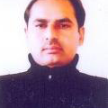
Sandeep Dahiya
Work place: Department of Electronics and Communication Engineering, Bhagat Phool Singh Mahila Vishwavidyalaya, Khanpur-Kalan, Sonipat, Haryana, India
E-mail: sandy_dahiya2001@yahoo.com
Website:
Research Interests: Computer systems and computational processes, Computer Architecture and Organization, Systems Architecture, Information Systems, Data Structures and Algorithms
Biography
Sandeep Dahiya is presently working as Assistant Professor in Department of Electronics and Communication Engineering, Bhagat Phool Singh Mahila Vishwavidyalaya Khanpur-Kalan, Sonepat since July 2009. He also served as Lecturer in Hindu College of Engineering, Sonepat for 8 years. He is having 14 years of experience in academic frontiers. He received his B.E. in Electronics Engineering in 2000, M.Tech in Electronics and Communication Engineering in 2006 and currently pursuing PhD in Electronics & Communication Engineering from UIET, MDU Rohtak. He has to his credit published 21 articles published and presented in refereed journals and proceedings. He has convened/coordinated 07 national workshops on design and simulation tools for students and faculty, UGC sponsored faculty development programme and national conference at University. He was also the Training and Placement Officer of Electronics and Communication Engineering Department and member of University Placement and Counseling Cell. He is also the recipient life member of Scientific and Professional societies such as Indian Society for Technical Education (ISTE), Computer Society of India (CSI) and Institution of Electronics and Telecommunication Engineers (IETE). His current area of interest includes Optical Interconnects in VLSI, Digital Circuit & Systems and Simulation & Modeling.
Author Articles
A Gaussian Filter based SVM Approach for Vehicle Class Identification
DOI: https://doi.org/10.5815/ijmecs.2015.12.02, Pub. Date: 8 Dec. 2015
Vehicle identification or classification is one of the application areas that come under real time image processing. Vehicle recognition is having the significance in various applications including the traffic monitoring, load monitoring, number plate recognition, vehicle theft prevention, traffic violation detection, management of traffic etc. As the images are captured as primary data source, it can have number of associated impurities which include the background inclusion, object overlapping etc. Because of this, object detection and recognition is always a challenge in real time scenario. In present work, a robust feature based model is presented for feature extraction and classification of vehicle images. The presented model is applied on real time captured image to categorize the vehicle in light, medium and heavy vehicle. Firstly, the vehicle area segmentation is performed and later on the Gaussian filter is applied to extract the image features. This featured dataset is processed under Support Vector Machine (SVM) based distance analysis model for vehicle recognition and vehicle class identification. The experimentation results of present investigation shows the recognition rate of devised system over 90%.
[...] Read more.Ensuring Employment and Employability through Electronics Engineering Education: A Case Study of BPS Women University
DOI: https://doi.org/10.5815/ijmecs.2015.11.05, Pub. Date: 8 Nov. 2015
Engineering education plays a pivotal role in the development of technologies, society, nation, economy and employment. It is well evident that in the information age, technology is developing very fast and correspondingly the demand for highly skilled and qualified professionals is also increasing. One of the most critical issues in engineering education is handling placement of young technocrats from an industrial perspective to prepare the required workforce in the 21st century.
The trajectory of development of Electronics Engineering (EE) has intersected every walk of human life. The last decade has also witnessed an assorted increase in Electronics Engineering Education in India. Infact, most of the engineering institutes imparting EE education countrywide focus only on domain knowledge and a mere 25% of the engineering professionals are actually employable. Along with domain knowledge, there are non-technical skills and competencies which play a significant part in contributing to an individual's effective and successful participation in the workplace.
This article throws light on career opportunities that will go a large way towards ensuring successful career planning and handling placement prospects. The paper addresses the career prospects in a broader domain of electronics engineering and other allied fields. The study will also focus on ongoing activities and initiatives at BPSMV State University in Haryana.
Other Articles
Subscribe to receive issue release notifications and newsletters from MECS Press journals